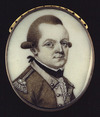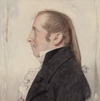.
Thomas Davis, a member of the wolf clan and cousin of Joseph Brant [Thayendanegea*], fought as an ally of the British throughout the American
spring of 1777 he met Joseph Brant [Thayendanegea*], who was probably a relative, and about 300 other Indians and loyalists at the Indian village
[Thayendanegea*] might lead the Indians to join them. He and the colonial authorities had been at loggerheads for a decade over his claim that the Six Nations had the right to sell and lease land on any
. 1794 near present-day Brantford, Ont., a member of the turtle clan and youngest son of Joseph Brant [Thayendanegea*] and his wife Catharine
between Joseph Brant [Thayendanegea] and another Six Nations chief. “I am much indebted on this and many other
the siege the Indians sacked the town. Despite the efforts of Butler and Joseph Brant [Thayendanegea*] to restrain them, they killed over 30
[Thayendanegea*] at Grand River, he returned to Niagara. With David Ramsay* as a guide, he set off through upper New York State to New York City. There
in company with Guy Johnson, Joseph Brant [Thayendanegea*], and others seeking the cancellation of Carleton’s arrangements
. Campbell was fascinated by the tale told by Clench and Joseph Brant [Thayendanegea*] of the time when they “once brought boys, and a number of women
[Thayendanegea*], Ebenezer Allan*, and Silvester Tiffany*. The purpose was the overthrow
sketch of Joseph Brant [Thayendanegea*], which ran serially in the New Dominion Monthly late in 1872, under her Ojibwa name
Karonghyonte (David Hill); m. Christiana Brant, second child of Thayendanegea* (Joseph Brant), and they had at least three children; d. 1834 of
Kerr* married Elizabeth Brant, daughter of Joseph [Thayendanegea*], thus strengthening the ties of the Kerrs with that prominent Mohawk
[Thayendanegea*], however, he was not involved as a major spokesman in dealings with other Indian peoples or with the government, nor did he participate as a negotiator or signatory in any of the land
, who after 1780 encouraged the formation of a confederacy to oppose American expansion [see Thayendanegea
[Thayendanegea*], but no Canadian works unmistakably dated to his third visit are known to have survived. By 1790 the 60th had moved to the Montreal region, and Peachey worked under Holland as a deputy
, Newark, and Grantham Township, he had managed to acquire 15,000 acres on the Grand River from Joseph Brant [Thayendanegea*]. Ironically, despite
whites remembered “brave” Ramsay’s heroic self-defence, Indians thought differently. Joseph Brant [Thayendanegea
Thayendanegea* (Joseph Brant)]. On the large Six Nations reserve along the Grand River, Tekarihogen exercised considerable power, not only among the Mohawks but also among other members of the Confederacy who
[Thayendanegea*]. Squatters, who had no legal arrangements with anyone, were numerous. Timber thefts were common, and Winniett eventually sought extra help to minimize losses. Marcus Blair of Hamilton was made






